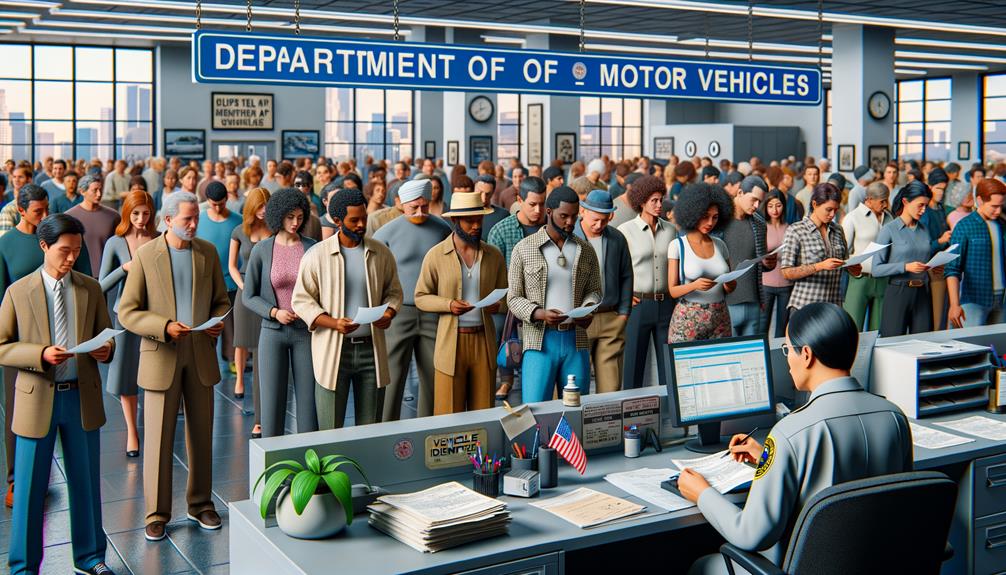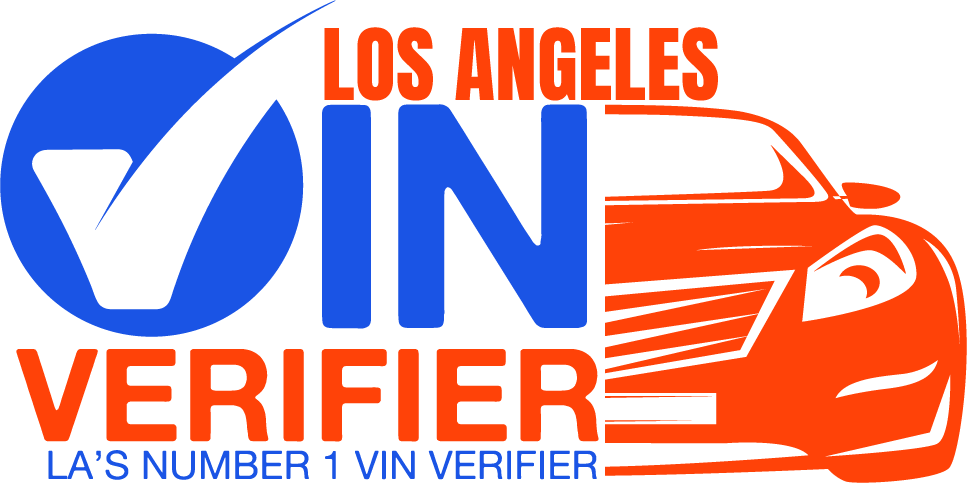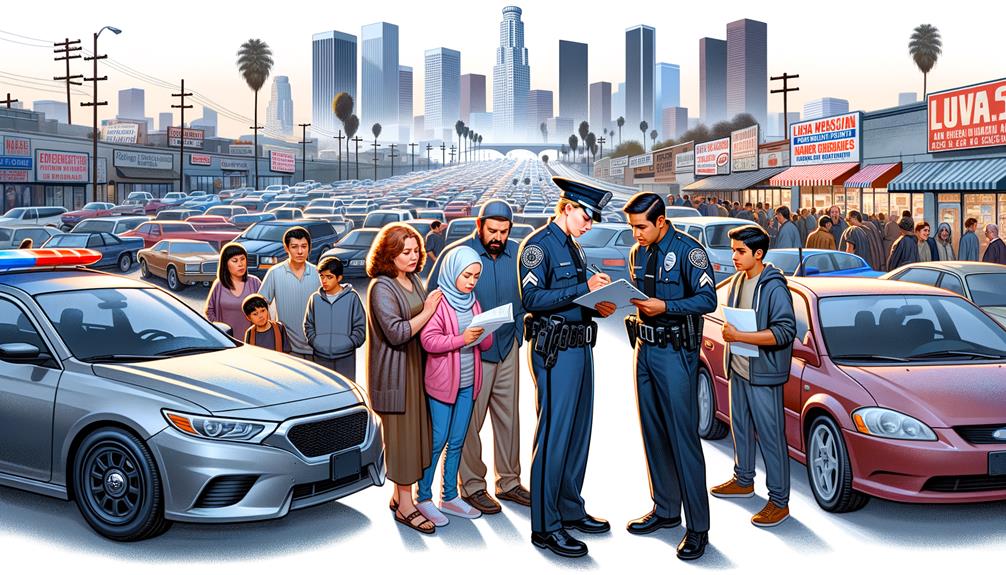You've probably heard about VIN verification, especially if you're considering buying a car in Los Angeles. It's not just a bureaucratic formality; it's a crucial checkpoint that safeguards you from fraud and legal headaches. In LA, where cars are as common as palm trees, ensuring that your vehicle's VIN matches up with official records is essential. This process helps to confirm that the vehicle you're buying isn't stolen and that its history is transparent. Now, you might wonder how often discrepancies occur and what happens if a mismatch is found. Let's explore the implications further.
Defining VIN Verification

VIN verification ensures that a vehicle's unique 17-character Vehicle Identification Number matches official records, confirming its legitimacy and helping prevent fraud. You'll find the VIN on the dashboard or door frame, and it serves as the vehicle's fingerprint, detailing its manufacturer, model, and year. This process is vital not just for your peace of mind but also for legal compliance.
When you take your vehicle for VIN verification, the DMV requires this step for registration and insurance purposes. It's a crucial measure to curb vehicle theft and ensure the authenticity of the vehicle's title and ownership. During the inspection, every detail of the VIN is checked against national and state databases to verify that the details align correctly.
The physical inspection involves a thorough check of the vehicle. The officer or authorized person will compare the VIN on your vehicle with the one in their system.
If everything checks out, you'll receive a verification certificate or a sticker. This certificate is proof that your vehicle is what it claims to be, cementing its authenticity and clearing it for further registration and usage processes.
Legal Requirements in LA
If you're registering an out-of-state vehicle in Los Angeles, you must legally undergo VIN verification to comply with California state regulations. This process ensures your vehicle's identity is confirmed and matches the title records.
You'll need to fill out the REG31 form, which is essential for documenting the verification at the California DMV. This form serves as a testament that your vehicle's identity has been thoroughly checked and verified.
Authorized entities, such as the DMV, California Highway Patrol (CHP), or licensed VIN verification stations, are the only ones permitted to conduct these checks. This is to prevent fraud and theft, safeguarding both you and the integrity of the vehicle registration system.
Remember, a smog check is also required for most gas and certain diesel vehicles. This needs to be completed alongside the VIN verification, further ensuring that your vehicle meets all legal and environmental standards before hitting the road.
Skipping VIN verification can lead to serious registration issues, fines, or other legal consequences. It's not just about following the rules; it's about ensuring your vehicle is rightfully yours and fit for the roads of Los Angeles.
Be diligent and make sure you meet all these legal requirements.
Process and Procedures

To ensure your vehicle's VIN matches its official documentation, you'll need to undergo a verification process conducted by authorized agencies like the DMV or CHP. In Los Angeles, this VIN verification process is crucial for preventing fraudulent registrations and confirming vehicle identification. During the physical inspection, an official will examine your vehicle's VIN placement, check the odometer reading, and compare all vehicle specifications against your provided documentation.
Once the inspection is complete, and if everything checks out, you'll receive a REG31 form, also known as a VIN verifier form. This document is essential for registering any out-of-state vehicle in California.
Remember, it's best to schedule an appointment for your VIN verification. You can do this via phone, online, or even by email. While walk-ins are occasionally accepted, they're not guaranteed due to the high demand for these services.
Keep in mind that while both the DMV and CHP offer this service at no charge, opting for a private verifier will incur a fee. These fees can vary, so it's wise to inquire in advance about the cost based on the service location and type you choose.
Common Verification Challenges
Navigating the VIN verification process in Los Angeles, you'll often encounter several challenges that can delay or even prevent vehicle registration. One of the most common challenges is discrepancies between your vehicle's VIN and its title documents. Such inconsistencies can lead to frustrating registration delays or outright denials.
Additionally, the presence of revived salvage vehicles adds another layer of complexity. These are prohibited from inspection, complicating your efforts if you're trying to register such a car.
When it comes to motorcycle verification, you may find it particularly tricky if you lack the proper supporting documentation, as these cases often face restrictions. The need for a physical inspection at authorized locations presents another hurdle. In busy areas of Los Angeles, securing a timely appointment can be a significant challenge, adding to the registration delays.
Moreover, language barriers and insufficient awareness about the required documentation can lead to misunderstandings during the VIN verification process. These issues not only complicate the process but can also add to your stress as you navigate the bureaucratic landscape of vehicle registration in Los Angeles.
Thus, being well-prepared with the right paperwork and understanding the requirements at authorized locations are crucial steps to overcoming these common challenges.
Benefits for Vehicle Owners

Despite the challenges, VIN verification offers significant benefits for vehicle owners in Los Angeles.
Firstly, it's your first line of defense against fraud. By confirming the authenticity of your vehicle's identity, you're ensuring the car you buy isn't stolen or salvaged under a false identity. This process is crucial, especially given the bustling and diverse automotive market in L.A.
VIN verification also plays a critical role during registration and insurance processes. It guarantees that your vehicle's VIN matches the official documents, shielding you from potential legal headaches and fraudulent claims. It's about making sure everything's above board, so you don't face fines or penalties for discrepancies that aren't your fault.
Moreover, the vehicle history reports you obtain through VIN verification provide invaluable insights. You'll learn about any previous accidents, title issues, or odometer tampering, which could influence your decision to buy or negotiate a better deal. This documented proof of your vehicle's clean history not only builds trust with potential buyers but also boosts the resale value of your car.
Lastly, VIN verification ensures you're in compliance with state regulations. Keeping in step with these rules helps smooth out the registration process, keeping you clear of unnecessary fines.
Verification Locations and Options
Where can you get your VIN verified in Los Angeles? You've got a variety of options that cater to your convenience and compliance with state regulations.
For starters, the DMV offers free VIN verification services, though you'll need to schedule an appointment and ensure all required documentation is ready. It's a straightforward choice if you're not in a rush.
If you're an AAA member, you can utilize their VIN verification services. Remember, this option isn't available for salvage vehicles, so you might need to look elsewhere for those specific needs.
For a more flexible approach, consider mobile verification services. These are offered by private VIN verifiers and start at around $97, bringing the service right to your doorstep.
Don't forget about licensed VIN verification stations scattered across Los Angeles. These stations provide an essential service ensuring your vehicle adheres to legal standards.
Moreover, the California Highway Patrol is another trustworthy spot for verification, particularly if you're concerned about the history of your vehicle, such as potential theft. Local law enforcement also conducts these checks, adding an extra layer of security for vehicle buyers, ensuring everything is up to snuff.

